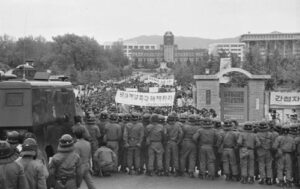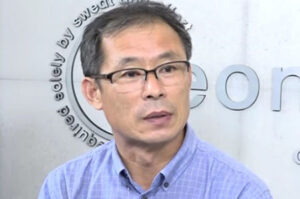by WorldTribune Staff, April 26, 2021
The leftist government in Seoul has been relentless in its attempts to silence a North Korean defector and author who detailed the North’s role in the 1980 “Gwangju incident” in which at least 165 people were killed and 75 went missing, a report said.
Lee Ju-Seong wrote in “Purple Lake” that North Korea deployed its special forces to South Korea, specifically Gwangju in 1980.

“For expressing that he has been stabbed, harassed, and prosecuted for the past 10 years,” Tara O noted in an April 23 report for East Asia Research Center.
The Gwangju Uprising is said to have began on May 18, 1980 at Chonnam National University. North Korea’s role in the uprising is increasingly suppressed by the Moon Jae-In government in Seoul.
Lee was sued for defaming former president Kim Dae-Jung in his book on the Gwangju incident. Last June, he was sentenced to 6 months in jail with 3 years of probation and ordered to pay a fine of ₩10 million ($8,950).
Now, as Tara O reported, the government has issued a notice to Lee saying that if he cannot pay the rest of his fine balance by the end of this month, authorities will confiscate his assets including his house and bank account.
“The Gwangju incident is so ‘holy’ that any questioning of the narrative is not allowed. This suppresses free speech and academic freedom,” Tara O wrote.
In “Purple Lake”, Lee writes about North Korean forces sent to Gwangju in 1980 and specifically refers to Kim Myung-Guk, a former North Korean special operations forces member who defected to South Korea.
“Kim has provided materials and summarized his experience of deployment to Gwangju in 1980 with a group of other North Korean forces,” Tara O noted.
Kim went to told the South’s National Intelligence Service (NIS) in 2006 that he went to Gwangju during the Gwangju Uprising as a special forces operator.
“Kim thought that the NIS would find the information valuable, but to his surprise, the NIS agent advised him not to mention it in the future. It is extremely controversial to mention North Korean involvement, which is usually followed by lawsuits,” Tara O noted.

Lee also wrote numerous other books, including “Sunhee”, a book about the grim reality of North Korean women who are sold in the sex industry in China. The book received an award from the Federation of Artistic and Cultural Organizations of Korea.
Lee’s books, however, “have been taken off the book store shelves and their distribution halted due to pressure from the government and the suing groups,” Tara O noted.
Lee’s work as director of the NK Design Association has been significantly impacted by the so-called Kim Yo-Jung Decree Law, which banned activists from sending information leaflets to North Korea. Lee’s NGO sends leaflets about capitalist and liberal democratic societies, clothes, and other items on balloons to North Korea.
Lee stated: “The leaflets and digital information sent to a jail-like North Korea, a door which can only be opened from outside, is like an oasis in a desert.”
The Moon administration cut off funding to all North Korean human rights organizations, including NK Design Association, soon after Moon’s inauguration.
Tara O concluded: “Lee Ju-Seong escaped North Korea, where freedom and human rights are suppressed. In South Korea, however, he is facing suppression of freedom of speech so unexpected and so harsh that he and his family’s lives have become miserable. The legal, physical, and psychological harassment of Lee Ju-Seong in order to silence him reflects the sad state of South Korean human rights and individual freedom.”
INFORMATION WORLD WAR: How We Win . . . . Executive Intelligence Brief
